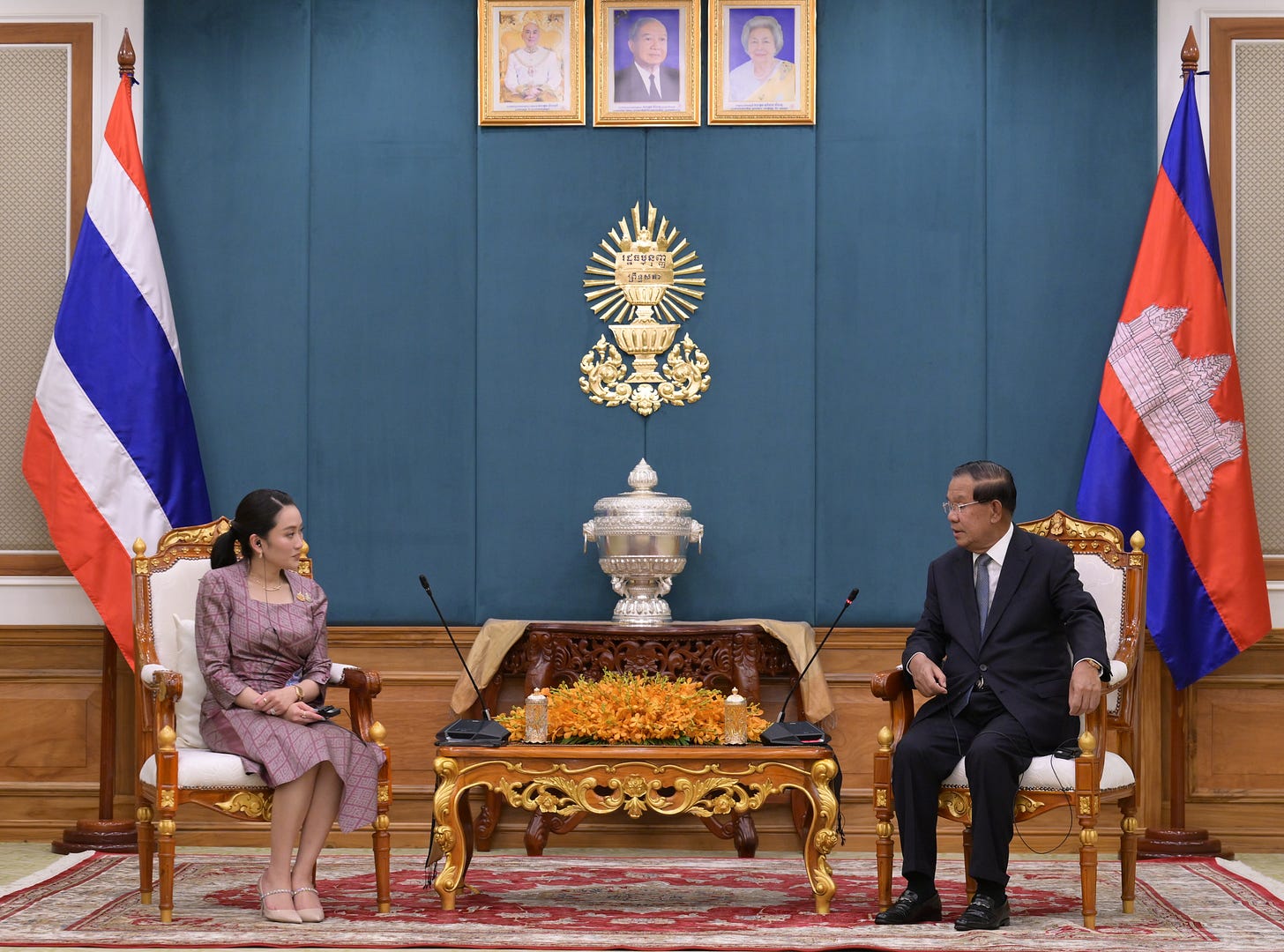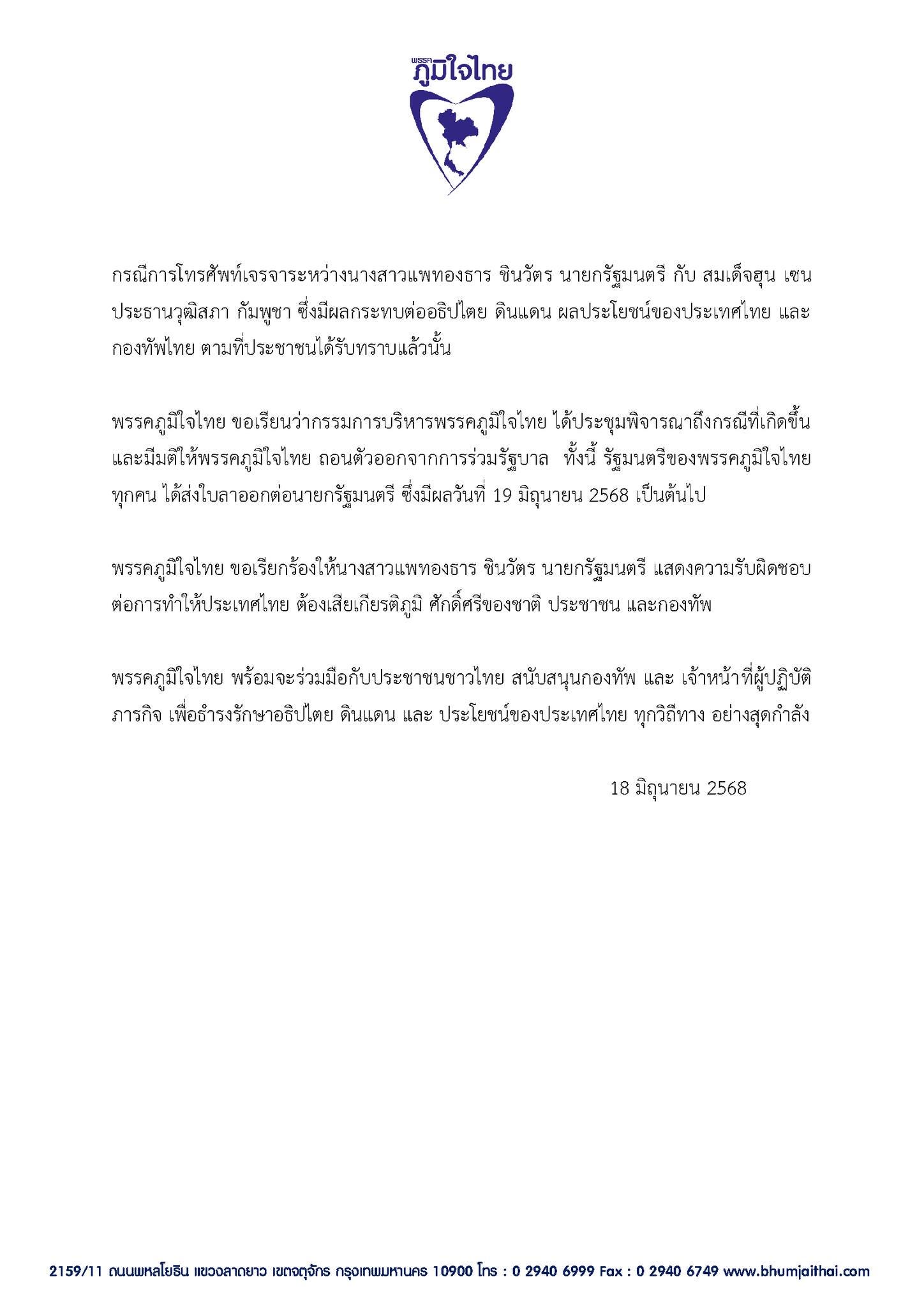Prime Minister's Call with Hun Sen Leaked; Bhumjaithai Leaves Coalition
Pheu Thai government on verge of collapse

In an extraordinarily dramatic day in Thai politics, Prime Minister Paetongtarn Shinawatra’s government may be irreversibly damaged after a voice recording of her phone call with Hun Sen leaked and the Bhumjaithai Party officially exited the Pheu Thai coalition.
Paetongtarn’s Phone Call with Hun Sen leaked
A recording of a phone call that took place between Paetongtarn Shinawatra and Cambodia’s de facto leader Hun Sen was leaked today. (Read here for more context about the recent Thailand-Cambodia tensions and why Pheu Thai already had preexisting trust deficit on this issue). To put the sequence of events briefly: Hun Sen announced that the nine minutes of recording was real and offered to release the full seventeen minutes. With that announcement, the prime minister was also forced to admit it was real. Later in the evening, Hun Sen released the full seventeen minutes of audio.
The phone call was damning, to say the least. It starts (here Paetongtarn is speaking to a translator — and also, emphasis mine):
Regarding the border issue, we understand that both Hun Sen and Ing (Paetongtarn Shinawatra) want peace between the two countries. We don’t want “Uncle” [referring to Hun Sen] to listen to the side that opposes us. Because if you listen to the commander of the 2nd Region Army — he is completely aligned with the opposing side. So, if you listen to them, we don’t want you to feel displeased or angry, because that was never our intention. Right now, they [the army] want to look cool, so they’re saying things that aren’t beneficial to the country. But in reality, we truly want peace, like before the border clashes happened. Please ask Hun Sen to sympathize with his "niece" a bit — lately, people in Thailand are joking that we’ve been sent off to be prime minister of Cambodia already! (laughs) Honestly, if there’s anything he wants, just let us know — we’ll take care of it.
Hun Sen immediately asks that the border be “opened like normal.” Paetongtarn then goes on to apologize for reports that Thailand would cut off water and electricity to Cambodia, and discusses for the need for a joint statement on reopening the border or otherwise she would be criticized.
In the full seventeen minute clip, the prime minister also says:
If there’s anything Samdech Hun Sen wants, just let us know so we can talk and come to an agreement. Because sometimes when he posts on Facebook, it really shakes the government — this Cambodia issue is the most destabilizing thing since Ing became Prime Minister. But Ing hasn’t responded at all, because she loves and respects him.
The text is damning and leaves little room for the prime minister to defend herself. She puts the 2nd Region Army on the “opposing side,” thus aligning herself with Hun Sen and against the Thai military which her government is responsible for. That alone would have caused a furor, and the prime minister attempting to explain these comments away as “negotiating tactic” was met with incredulity. But also sparking controversy is how she positions herself as a supplicant to Hun Sen and appears willing to take his orders (“if there’s anything he wants, just let us know”) and says that she has refused to respond to Hun Sen’s provocative statements because she “loves and respects him.” Paetongtarn’s press conference, where she said she now realizes Hun Sen only cares about his own popularity, did little to salvage the situation.
At another point, we can analyze the motivations behind why Hun Sen (and there could have been no other leaker) decided that this phone call should be made public. But most importantly at this juncture, the reaction in Thailand has been furious. People’s Party Leader and Leader of the Opposition Natthaphong Rueangpanyawut called for the prime minister to take responsibility by dissolving parliament. The Palang Pracharath Party called it “a wound to Thai peoples’ hearts” and declared that the prime minister had “lost all legitimacy as the leader of the nation.” In a widely liked post, former finance minister Korn Chatikavanij characterized the phone call as “treason” and called on the coalition parties to leave the coalition if the prime minister would not resign.
In just a few hours, Bhumjaithai did just that.
Bhumjaithai leaves the coalition, and the government is on the brink of collapse
This morning, I wrote about the three options that Bhumjaithai could take now that it was clear Pheu Thai wanted to assume control of the Interior Ministry. It appeared that Bhumjaithai, choosing to stand their ground, was already on the way out before the phone call was leaked. The party leader, Anutin Charnvirakul, had begun clearing out his office and he said that he had instructed the party’s ministers to do the same.
But the furor over the call — we do not know if Anutin knew its contents in advance — made for some impeccable timing. Bhumjaithai released a statement officially announcing that its party executives had voted to leave the coalition, not over losing control of the Interior Ministry, but because of Paetongtarn’s phone call. “The Bhumjaithai Party calls on Prime Minister Paetongtarn Shinawatra to take responsibility for causing Thailand to lose the honor and spirit of the nation, people, and army,” the statement said.
At a stroke, Bhumjaithai’s decision leaves the Pheu Thai government on the brink of collapse. Earlier today I had noted that Pheu Thai was probably reasonably confident about the parliamentary arithmetic. Its coalition partners could collect some MPs and shore up the government’s majority. But even if this happens — and it’s not at all clear that there are MPs who are willing to damage their reputation by joining a government being accused of treason — their numbers may not be enough to shore up a majority anyway.
That is because the United Thai Nation Party has scheduled a meeting of its party executives, after announcing that they will “stand firm in defending the integrity, honor, and national interest of the country and people above all else.” It appears likely that the party will now leave as well. The UTN is currently undergoing its own civil war, but even if just the 17-18 or so MPs associated with party leader Pirapan Salirathvibhaga leaves the coalition, that would be enough to bring Pheu Thai below a majority. And I would assume that the UTN leaving would mean the dam has broken, and little would stop other coalition parties who realize they are aboard a sinking ship to jump as soon as possible to escape damage by association.
What’s next?
Very few predicted at the start of the day that by dawn, the Pheu Thai government will have already come so close to falling. But yet that is the speed in which Thai politics is now moving. Of course, Pheu Thai could shore up a majority somehow and we might end up with something remotely resembling the status quo. But I find that unlikely. The government crumbling seems to be a question of when not if. So if the Paetongtarn Shinawatra government falls, what comes next?
There are a couple of potential scenarios. Paetongtarn could decide to resign and Pheu Thai could then try to keep its coalition partners aboard. In this case, Pheu Thai could nominate its third prime ministerial candidate, Chaikasem Nitisiri, or allow another coalition partner’s prime ministerial candidate to take the reins, and the government would continue in some form. This scenario is filled with issues, however. Chaikasem was already considered last year after Srettha Thavisin was dismissed by the courts, and his past comments on amendment of Section 112 were reportedly thought as concerning. Meanwhile, there are now few viable candidates: PPRP leader Prawit Wongsuwan has too little support, the Democrat candidate Jurin Laksanawisit is on the record as opposing the Pheu Thai government. That would leave Anutin, but Bhumjaithai just very publicly left the government. Could they return if the prime minister resigned? Stranger things have happened, but it would be an extraordinary u-turn and rescuing Thaksin does not have clear electoral benefit for Bhumjaithai.1
Another scenario is that Paetongtarn decides to dissolve the House of Representatives and call an election, or the government is brought down by a vote of no confidence. This would be the most straightforward. But this would come at possibly the worst possible time for Pheu Thai: their policy pledges are unfulfilled, the economy is doing poorly, their voters are potentially still angry at their betrayal of Move Forward two years ago, and most importantly the party has now become embroiled in a highly public scandal that is probably almost universally unpopular with voters. We can discuss the electoral outlook further in this newsletter if an election is called.
And this being Thailand, you can never entirely rule out an extraconstitutional pathway. A military coup is not yet likely. But the fact that it no longer feels unthinkable shows how much the Thai political terrain has shifted in just a few weeks.
In any case, the departure of Bhumjaithai and potentially the United Thai Nation Party seems like we have come to the end of the “grand compromise”: the power-sharing arrangements between the Thaksinites and the conservatives that have persisted since the 2023 general election. A new, uncertain era in Thai politics beckons.
Another scenario here is Pheu Thai forms a new partnership with the People’s Party, but there is very little incentive for the latter to pursue that now.



Anutin is the smartest cookie on the block. He’s stolen the PPs thunder by resigning over an issue which surely unites most Thais. There must be an electoral market amongst the profession middle classes for a conservative who is prepared to call out the Shinawatra circus while rejecting the radicalism of the PP. Maybe the overwhelming vote against Thaksin at the medical council was a bit of a straw in the wind to that effect.
Who could Thaksin nominate as PM candidate if an election is called. He has no one with charisma to call on
Hun Sen has truly shafted PT. I'm surprised he's that angry